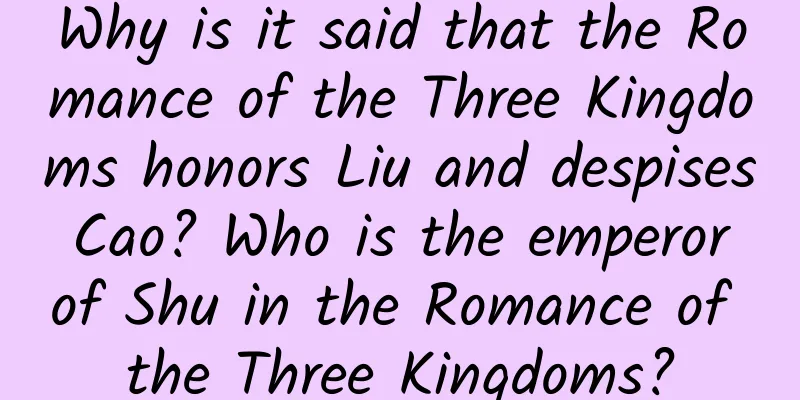Why is it said that the Romance of the Three Kingdoms honors Liu and despises Cao? Who is the emperor of Shu in the Romance of the Three Kingdoms?

|
The Romance of the Three Kingdoms can be roughly divided into five parts: the Yellow Turban Rebellion, the Rebellion of Dong Zhuo, the Warring States, the Three Kingdoms, and the Three Kingdoms Returning to the Jin Dynasty. It describes the historical events of nearly a hundred years from the end of the Eastern Han Dynasty to the beginning of the Western Jin Dynasty. It mainly describes wars, telling the story of the warring wars among the heroes in the late Eastern Han Dynasty and the political and military struggles between the Three Kingdoms of Wei, Shu, and Wu. In the end, Sima Yan unified the Three Kingdoms and established the Jin Dynasty. It reflects the transformation of various social struggles and contradictions in the Three Kingdoms era, summarizes the great historical changes of this era, and shapes a group of powerful heroes of the Three Kingdoms. So, why is it said that the Romance of the Three Kingdoms respects Liu and despises Cao? Who is the emperor of Shu in the Romance of the Three Kingdoms? Let's take a look at the introduction of Encyclopedia Knowledge Network for these questions! Contents of this article 1. Why is it said that the Romance of the Three Kingdoms honors Liu and disparages Cao? 2. Who was the emperor of Shu in the Romance of the Three Kingdoms? 3. Who is the hero in the Romance of the Three Kingdoms? 1Why is it said that the Romance of the Three Kingdoms honors Liu and despises CaoThe specific reasons are as follows: 1. The author needs to express the contradictions and conflicts in the novel, so he must choose two opposite sides, positive and negative, so that readers can feel the distinction between good and evil, have a clear position, and have a deeper impression; 2. The idea of "respecting Liu and disparaging Cao" was formed in the Southern Song Dynasty. At that time, the ruling class of the Southern Song Dynasty was weak and incompetent, and lost a large area of land north of the Yangtze River. It was content with the status quo of half of the country. The situation was somewhat similar to that of Shu Han in the southwest corner during the Three Kingdoms period, which led to people's idea of respecting Liu and disparaging Cao. 3. "Respecting Liu and disparaging Cao" mainly reflects the choice of the general public towards feudal politics and feudal politicians according to the standard of "if you treat me well, I will be your follower; if you abuse me, I will be your enemy", which has historical rationality. 2Who is the emperor of Shu in the Romance of the Three Kingdoms?Liu Chan, nicknamed Adou, was the son of Liu Bei. He succeeded to the throne as the emperor of Shu after Liu Bei's death. When Liu Chan first became emperor, he fully trusted Zhuge Liang and entrusted him with all military and national affairs. However, in the later period, he became more and more convinced of slander and interfered with Zhuge Liang's military and political policies, which led to Zhuge Liang's repeated northern expeditions without success. After Zhuge Liang, Jiang Wan and other wise ministers died one after another, Liu Chan was unable to control the country's affairs. The eunuch Huang Hao began to monopolize power, forcing Jiang Wei to go out to cultivate land to avoid chaos, and Shu gradually declined. Later, the Wei Kingdom launched a large-scale attack on Shu, and Liu Chan surrendered and moved his family to Luoyang, where he was named Duke of Anle. 3Who is the hero in Romance of the Three Kingdoms?1. Guan Yu. Killed Hua Xiong with a cup of wine. Killed Yan Liang and Wen Chou, famous generals from Hebei. Passed five passes and killed six generals. Traveled a thousand miles alone. Went to a meeting with a single sword. Released water to flood seven armies. 2. Zhuge Liang. Although Lu Xun said that Zhuge's wisdom was close to that of a demon, there was already such a rich and colorful description before he appeared. Liu Xuande visited him three times. He burned Bowangpo. He burned Xinye. He calculated Huarong Road with wisdom. He argued with many scholars. He scolded Wang Lang to death. He angered Zhou Yu three times. He cleverly took advantage of the east wind. He captured Meng Huo seven times. He wrote the "The Memorial to the Emperor on the Imperial Clan" and scared away Huo Zhongda... There are countless examples. 3. Zhao Yun. A handsome, brave and well-versed general in military tactics. He went in and out of the battlefield seven times. He saved his master in Dangyang. He was still able to fight against five generals at an old age. |
Recommend
Is it safe to eat the Basa fish that costs only a few dollars a pack in the supermarket?
Have you noticed that restaurants love to use Bas...
What can pregnant women eat to treat constipation?
Constipation is not a disease. It mainly refers t...
Does your belly swell when you lie flat during pregnancy?
When a woman is pregnant, her belly will slowly g...
What medicine is good for women who sweat spontaneously
Many people sweat after sleeping at night, especi...
There are positive signs of sexual indifference in women
Women's sexual apathy is mostly caused by cer...
Five tricks to help women stay beautiful forever
1. Drink a cup of green tea after a meal "My...
I have a pimple on my vulva and it hurts
The health of the private parts is very important...
Do women need to do muscle training for fitness?
In our lives, only a small number of female frien...
Lower abdominal pain, brown leucorrhea
Today we are going to talk about lower abdominal ...
Be careful! If you use a humidifier incorrectly, it will not only add moisture...
Whether in the north or the south, people try to ...
What to do if there are small itchy bumps on the labia
I believe everyone knows the importance of labia ...
The process of belly enlargement during pregnancy
It is not easy for women to conceive. During the ...
What to do if you have stomach pain after having an IUD inserted
Many female friends will experience pain after ha...
What to do if you have stomach pain in late pregnancy
Abdominal pain during pregnancy is a very normal ...
How long does it take to discharge after injection abortion?
If a girl has an unexpected pregnancy and wants t...









